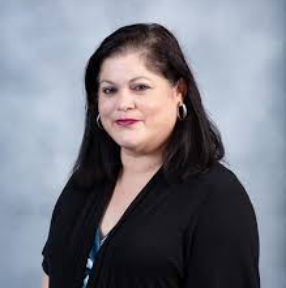
Personal Observations of the Impact of COVID on an Individual and Community Level
Jacqueline Martinez, CPS
Jacqueline Martinez, CPS, is a Peer Consultant at the COE, Vice President for the NAMI Latino in Massachusetts, and peer specialist for sheltered guests at the Lindemann Mental Health Center in Boston.
Q: What have been some of your personal challenges during COVID-19?
A: Not being able to see loved ones has been very difficult. I haven’t been able to see my daughters. One is in Canada, the other one is homeless and using. I can’t put myself and my family here at risk. We need to keep safe. And then having to deal personally with working outside of the home, as a front-line worker, and essential staff. Trying to do everything possible to keep myself healthy, to take proper precautions. Wearing the mask, sanitizing, washing my hands. When I get home, I strip at the door, and go take a shower. It’s kind of depressing sometimes because I’m not just able to come home and give my family a hug and a kiss, that’s something that can’t happen.
Q: In what ways has COVID-19 specifically impacted the peer and peer specialist community?
A: COVID-19 has given the peer community the opportunity to come closer together without having to put ourselves at risk through connecting virtually. A lot of people that I know and work with that have difficulties with leaving their safe space and now have been able to stay connected and communicate virtually with others.
Q: What examples have you seen of resiliency in the context of COVID-19?
A: I have seen so much cohesiveness in trying to find quick ways to support each other … with lot more outreach being done in the communities that are at a greater disadvantage: those that might be homeless, non-English speaking, or don’t know how to get the resources that they need, like for food and benefits. I’ve seen people are willing to help one another. In the Latinx community we’ve had so many community members and business owners come together and provide food resources or childcare.
Q: What unique impacts have there been to the Latinx community?
A: I’m up in the North Shore and there is a high density of Latinx communities. A lot of people were afraid to go get tested for COVID, those with undocumented immigration status were afraid. Most families are in close quarters with multi-generations living under one roof. There’s also a lack of technology, access to technology, and knowledge of technology. People are having difficulties paying their bills and rent due to losing their jobs and possibly facing foreclosure or eviction from their homes.
Q: In what ways could communities use more support?
A: I think communities should speak up and not just leave it to one person.There needs to be more access to peer services, medical appointments, ..free internet,…we definitely need money to do this. People need to come together and fight for whatever cause. If it’s the lack of food, if it’s a lack of childcare in the community. People need to go to the legislature; people need to go to their representative. This is what we need.
Jaqueline Martinez, CPS
Peer Consultant, MGH COE
Vice President, NAMI Latino
Peer Specialist, Lindemann Mental Health Center